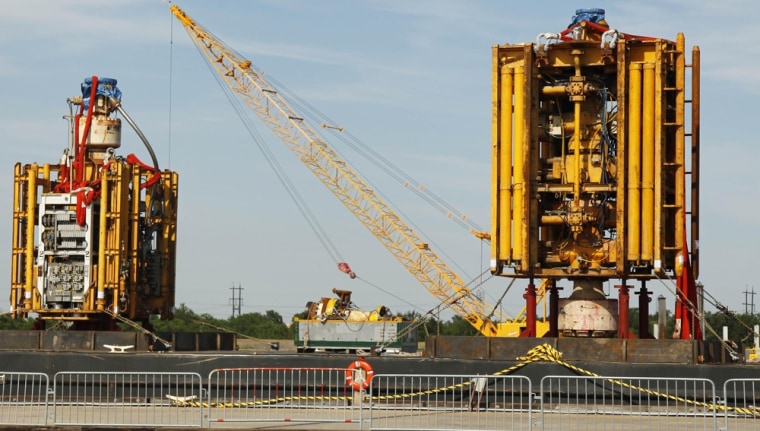As it prepares to lift a ban on exploratory drilling in deep waters, the Obama administration on Thursday released two sets of rules for offshore oil drillers.
"Operators will need to comply with tougher requirements for everything from well design and cementing practices to blowout preventers and employee training," Interior Secretary Ken Salazar said in a statement. "They will also need to develop comprehensive plans to manage risks and hazards at every step of the drilling process, so as to reduce the risk of human error."
"These new rules and the aggressive reform agenda we have undertaken are raising the bar for the oil and gas industry’s safety and environmental practices on the Outer Continental Shelf," he added.
The rules included many of the recommendations made in a report Salazar released in May, including requirements that rigs certify that they have working blowout preventers and standards for cementing wells.
The well and blowout preventer failed in the massive BP spill in the Gulf of Mexico.
Salazar has said new rules must be in place before the Interior Department lifts its temporary ban on exploratory drilling. The ban is set to expire Nov. 30, but officials hope to end it early.
Salazar on Thursday defended the deepwater drilling ban. "There will always be risks associated with deepwater drilling, but we will only lift the suspensions when I am comfortable that we have significantly reduced those risks," he said.
The changes are grouped under two new rules:
- A Drilling Safety Rule "prescribes proper cementing and casing practices and the appropriate use of drilling fluids in order to maintain well bore integrity, the first line of defense against a blowout," the Interior Department said. "The regulation also strengthens oversight of mechanisms designed to shut off the flow of oil and gas, primarily the Blowout Preventer (BOP) and its components, including Remotely Operated Vehicles (ROVs), shear rams and pipe rams. Operators must also secure independent and expert reviews of their well design, construction and flow intervention mechanisms."
- A Workplace Safety Rule "requires offshore operators to have clear programs in place to identify potential hazards when they drill, clear protocol for addressing those hazards, and strong procedures and risk-reduction strategies for all phases of activity, from well design and construction to operation, maintenance, and decommissioning."
Interior noted that the rule stems from a recommendation by the oil industry itself. It "makes mandatory American Petroleum Institute (API) Recommended Practice 75, which was previously a voluntary program to identify, address and manage safety hazards and environmental impacts in their operations," the department stated.
Lee Hunt, chief executive of the International Association of Drilling Contractors, said the new rules could make offshore drilling safer, but would add layers to a regulatory process that's all but shut down drilling in the Gulf. The government has approved just a handful of shallow-water drilling permits during the past few months, and oil companies are growing frustrated with the wait.
"All of this can be done," Hunt said of the new rules. "The question is if we're now getting to a choke point," in which the permitting process grinds to a complete halt.
A spokesman for the American Petroleum Institute said the oil industry group will review the rules. The API has called for a clear, practical and well-defined review process that will protect the environment and allow drilling to resume.
"We cannot have an approval process that creates unpredictable delays that could place at risk the flow of domestic energy in our country," said Erik Milito, a lobbyist for the group. Extended delays in permit approvals are likely to discourage investment in new projects — hampering job creation and restricting energy production, he said.
Richard Charter, senior policy adviser for Defenders of Wildlife, cheered the new rules. It's hard to tell if they will make the Gulf safer, he said, but at least "it shows they're not sweeping this under the rug. The era of 'drill baby drill' is over."
Government regulators have long been criticized for a cozy relationship with the oil and gas industry — a situation Salazar and other Obama administration officials have vowed to fix.
Even after the temporary ban on exploratory drilling is lifted, drilling is unlikely to resume quickly.
"You're not going to see drilling going on the next day, or even the next week," Michael Bromwich, director of the agency that oversees offshore drilling, said this week. "It's going to take some time."
The American Petroleum Institute said it will review the rule and offer comments. The API has called for a clear, practical and well-defined review process that will protect the environment and allow drilling to resume.
"We cannot have an approval process that creates unpredictable delays that could place at risk the flow of domestic energy in our country," said Erik Milito, an API official. "Operators want regulations that provide certainty."
Extended delays in permit reviews and approvals are likely to discourage investment in new projects — hampering job creation and restricting energy production, Milito said.
Even after the temporary ban on exploratory drilling is lifted, drilling is unlikely to resume quickly.
"You're not going to see drilling going on the next day, or even the next week," Michael Bromwich, director of the agency that oversees offshore drilling, said this week. "It's going to take some time."
Moreover, the rules announced Thursday are not the final step, Salazar said, noting that the Interior Department is likely to propose requiring that emergency cutoff devices known as blowout preventers have a second set of blind shear rams — the parts that can shear off and shut down wells in the event of a catastrophic blowout.
